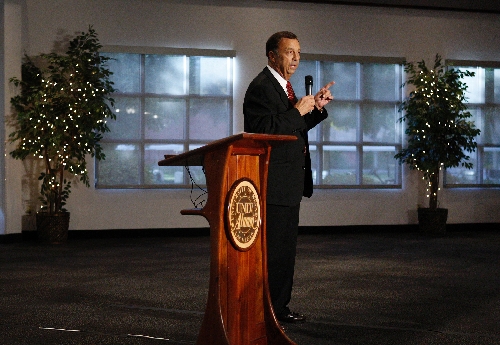UNLV athletics face crunch time
UNLV's athletic department is projecting a $1.93 million deficit this fiscal year that will drain nearly its entire reserve fund, and athletic director Jim Livengood faces some tough choices as the likelihood of further cuts looms.
Livengood plans to reorganize the department. Although he said no decisions have been made, Livengood has not ruled out furloughs, salary freezes or layoffs.
"Right now, I'm looking at everything," said Livengood, hired in December after spending 16 years as Arizona's athletic director. "I'd like to get away from (layoffs). I just don't know that we can."
UNLV estimates that it will end its fiscal year June 30 with $26.06 million in revenues and $27.99 million in expenses.
The $2.07 million reserve fund that the department had at the beginning of the fiscal year is projected to drop to $135,415.
The Thomas & Mack Center is expected to have $1.45 million in reserves, and the athletic department could draw upon that money.
Rhett Vertrees, UNLV associate vice president for financial services, said he was optimistic about increasing the reserve fund for the next fiscal year because of money-making football games at home against Wisconsin and at West Virginia. The Wisconsin game should sell out, and UNLV will receive $750,000, all but $10,000 in cash, from West Virginia. UNR, another top draw, also visits.
Those games will help a football program expected to end the current fiscal year $3.11 million in the red.
Even with a home schedule that included Brigham Young, Utah and Oregon State, football ticket revenue came in at $2.10 million, or $206,122 under budget, last season.
UNLV is hopeful that there will be newfound enthusiasm -- and increased revenue -- for the program under first-year coach Bobby Hauck.
"Generally, there are two things on campus that make money -- football and parking," Hauck said. "We need to get to the point where we're helping generate some revenue around here. We want to do our part, and we can. If we're worth watching, people will come watch us."
UNLV could use a boost because the state Legislature is expected to cut about $2 million in funding to Rebels athletics over the current and the next fiscal years.
The state is expected to provide $5.93 million to athletics next fiscal year, but $3.14 million goes to scholarships, which is turned back over to the state. In reality, UNLV will receive less than $3 million in state aid, with about $1.2 million going to facility maintenance.
The school's budget for the current fiscal year has suffered not only an $809,685 loss in state revenue but also a $600,000 to $700,000 setback with the change in football staffs after Mike Sanford's firing.
UNLV is looking to save where it can, and all sports, particularly those in season, are watching the bottom line. The baseball team, for example, has 36 home games this season and 35 next year. It typically plays at home 30 to 33 times.
A cheap weekend road trip costs about $15,000, and the Rebels can pay $10,000 to bring in a visitor.
"We've always been fiscally conscious," seventh-year baseball coach Buddy Gouldsmith said. "We've never gone over budget in my time here."
Livengood said he hopes eventually to run the department free of state and university financing. That is the goal of UNLV president Neal Smatresk as well. At Arizona, Livengood kept the budget in the black despite not receiving state funds for athletics.
He said the two major factors at Arizona were the improvement in football and "growth in fundraising."
UNLV recently lost its head fundraiser, Bill Brady, who left for his alma mater, Long Beach State. Because the fiscal year is nearly over, Livengood will wait to fill the position this summer.
He has already received interest in the opening, and Livengood said getting the right person is vital.
"A good development person can quadruple what you pay them just because they're that good at raising money," Livengood said.
Livengood wants to reorganize the department but hasn't made final decisions. He is also looking at how the entire department is operated.
"No decision you make is going to be embraced by everybody," Livengood said. "If you're in this job as an AD, if you make decisions based on popularity, you're going to lose every time. You better make decisions based on what's best for the institution."
Just about any decision, he said, should be made with the well-being of the student-athletes in mind or "we're kidding ourselves.''
Livengood said capital projects, such as the $12 million privately funded men's basketball practice facility expected to be constructed by 2011, are important. Speculation about other similar projects, he said, was premature.
Even with the economy still a mess, Livengood knows UNLV can't sit still while Mountain West Conference powers BYU, Utah and Texas Christian move forward, especially in football.
"If we're really serious, we've got to get after it right away," Livengood said, "because none of those schools are sitting back and saying, 'You know, UNLV is going through a tough time with economics.' It doesn't work that way."
Contact reporter Mark Anderson at manderson@reviewjournal.com or 702-387-2914.






















